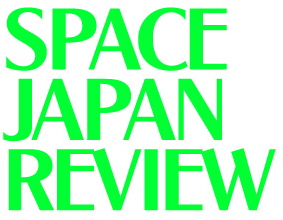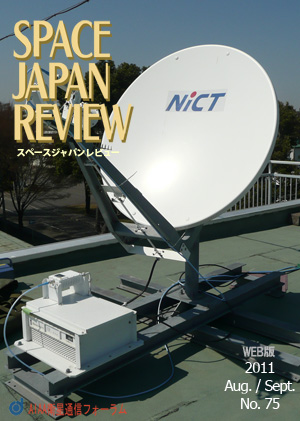
Space Japan Review 8 - 9
No.75 August / September 2011
 Space Japan Review, No. 75 VSAT earth station for WINDS, which was installed in Iruma Camp just after the Great East Japan Earthquake by NICT. (Courtesy by NICT) |
Cover Page VSAT earth station for WINDS, which was installed in Iruma Camp just after the Great East Japan Earthquake by NICT. Interview with CEO (in English) Mr. Mike Pley President and CEO, COM DEV, Toronto Canada In our interview, COM DEV President and CEO Mr. Mike Pley speaks passionately about his business strategies for worldwide satellite communications in All of frequency band for broadband applications. Space Japan Review (SJR): Thank you for taking time from your busy schedule for this interview. We appreciate the contribution you've made to AIAA-JFSC.... Satellite Communication and I (in English) Roberta Campo Project Manager, Innovation Team Eutelsat SA It will be soon 10 years that I have been working in Eutelsat SA in Paris, France. When I arrived, in January 2002, the company had recently turned in a private French company, after several decades as an inter-governmental organization (IGO). The heritance from that previous status was a multicultural environment, counting 25 different nationalities among the 380-person staff... Space Japan Opinion (in English) Methodology of Research and Development From Research of Satellite Communications to General Research 1. Competition Predominance and Researchers' Attitude Takashi Iida, JFSC Special Advisor, AIAA Fellow (R&D) on satellite communication, especially for national security. This is why we step forward in the 21st century of the chaos which was determined by the terrorist attacks to the U.S.A. on September 11, 2001, and in order to deal in a century of chaos, R&D of national security, especially satellite communications becomes particularly more and more important. On that occasion, an R&D methodology in general R&D as well as one of satellite communications is argued based on experience of the management of Communications Research Laboratory of the author's former job. Therefore, the content may be based on the author's own dogmatism and prejudice, but please forgive me because of an opinion column. Space Japan Book Review (in English) Tyler Cowen: "The Great Stagnation", Penguin, 2010. From a satcom researcher point of view Reviewer: Takashi Iida, Editorial Advisor This book was introduced into an economic commentary in the Nikkei Shimbun Newspaper on March 7, 2011 [1], and this book seems to be "the hottest economic book" for persons concerned with the U.S. policy formation and the economic press. A related discussion seems to be performed in Web flourishingly afterwards. Then the reason why it is taken up in this column is because there is a description of technological innovation policy and space development, although the effect of space development is described to be relatively negative. Let's introduce it now. Flash Report (in Japanese) SKY Perfect TV in Great East Japan Earthquake SKY Perfect TV
Education Corner (in Japanese) On Desire to Space Yukiya Hanada Graduate School of System Design Tokyo Metropolitan University
Satellite Commentary, Quasi-Zenith Satellite Story II (in Japanese) Change to the Satellite Navigation System Susumu Kitazume, Editorial Advisor (PDF:390kB) Space Japan Interview (in Japanese) Learned from Development of CS "Sakura, Cherry in English", blooming in the universe of "Showa" Akio Iso, Iso SpaceNet Research (PDF:529kB) Introduction of New Editor (in Japanese) Takashi Kadowaki (PDF:118kB) From Editor |
Editorial Board of Space Japan Review, AIAA JFSC: |
Members of Editorial Board are expecting to have any |
